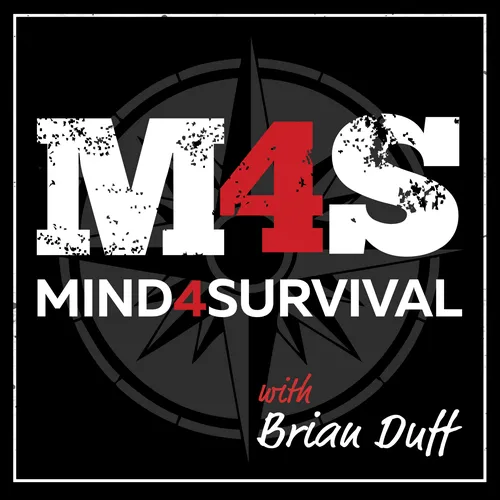SHTF Mindset: How to Think When Everything Fails
- Author
- [email protected] (Brian Duff)
- Published
- Tue 13 May 2025
- Episode Link
- https://mind4survival.com/shtf-mindset-preparedness/
What if I told you that when the next major disaster strikes—you’ll most likely be behind, not ahead? That's part of what SHTF mindset is all about.
No matter how prepped you feel, when you're at the epicenter of a serious crisis, you'll likely start off scrambling to get ahead. You’ll start as the underdog.
You don’t control the clock. You don’t get to pick the terrain. And the systems you thought you could count on? Nothing is guaranteed when the worst happens.
Minor emergencies? Sure, you might be able to muscle through. Those with instinct or grit are often good to go. But major, societal, and system-shaking events? They hit with more force than you expect and expose the unseen cracks in the foundation.
And you? You're scrambling. Reacting. Playing catch-up.
That’s the uncomfortable truth. And it’s exactly why preparedness can’t be passive. It’s why mindset matters and situational awareness matters. And it’s why, if you want to come out the other side, you need to train like the fight has already started—and you're behind on points.
Once you realize you're always the underdog when it hits the fan, you can start preparing like someone who plans to fight, to lead, and maybe—just maybe, come out on the other side no worse for wear.
TL;DR When disaster strikes—you’re the underdog trying to keep up. But with the right mindset, situational awareness, and practical readiness, you can stack the odds in your favor and come out ahead.
Quick Look at What You’ll Learn
Toggle
When the SHTF, the Playing Field Is Never EvenMindset Is the First AdvantageSituational Awareness: Understand Before You ReactAbility Gives You OptionsLuck Still Plays a Role—But Don’t Count On ItThe Bottom LineAdditional Resources
When the SHTF, the Playing Field Is Never Even
Let’s break it down. When it hits the fan:
You don’t always get a warning. Even when you do, it’s usually not enough. Disasters rarely show up with a countdown timer and a user manual.
You're going to start at a disadvantage. The lights go out. The water stops flowing. Emergency services get overwhelmed. Many people panic.
The threats and hazards are unpredictable. It might be a wildfire, a tornado, civil unrest, or a grid failure. The disasters change. Your situation changes. But what are the odds when it hits the fan? They’re almost always against you.
This isn’t Hollywood. In the real world, when the mess is big enough, the cavalry may not be there when you need them. In that case, you're the cavalry—tired, under-resourced, and possibly playing catch-up in your own rescue.
That’s the nature of a real crisis, especially when the SHTF and the situation overwhelms basic systems and instincts alike. Think Hurricanes Helene and Katrina. Look to the L.A. and Maui Wildfires. Many survived through self-rescue—they were their own first responders.
That's why we prepare.
Because when people accept that disasters don’t fight fairly, they start stacking the odds back in their favor.
Mindset Is the First Advantage
If you’ve read Mind4Survival, you already know the formula:
Capability × Luck = Chance of Success
And what’s Capability?
Mindset × Ability.
In every emergency, mindset is what determines whether you freeze, fall apart, or fight like hell to adapt and overcome.
That’s why the most important prep isn’t the gear in your closet—it’s the perspective in your head.
A solid mindset keeps you from wasting time in denial.
It lets you act fast and with purpose while others are often stuck in confusion and meltdown.
